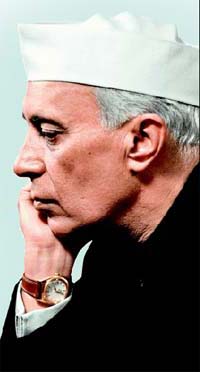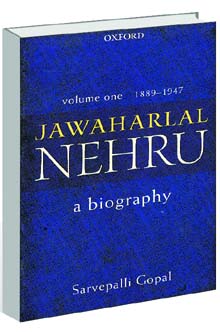|
 India through Nehruís eyes India through Nehruís eyes
Reviewed by M Rajiv Lochan
Jawaharlal Nehru, A Biography, Vol 1 1889-1947
by S. Gopal, Oxford University Press,
New Delhi.
 In
this monumental biography of Nehru his biographer, Gopal, shows us the
story of India through Nehruís eyes as it were. Gopal begins by
telling about the strategies of the British to win allies in India so
that there was always someone who was willing to support the unbroken
monopoly over power established by the East India Company. In the
process, grandees with loud-sounding titles were created. Rulers of
Indian riyasats, many of them as small as a handful of villages
and all of them tyrannical towards their people, were elevated to the
rank of "Counsellors to the Empress". Uneducated young men
of high birth were made low-level civil servants to help maintain
English control over India. Under these circumstances, self-made men
like Motilal Nehru, even when eager to please the English, found
English rule reprehensible. When his much-pampered son, Jawaharlal,
introduced Motilal to another world Ė one in which Gandhi was
questioning the right of the English to ruleóMotilal eagerly joined
in and encouraged Jawaharlal to focus on getting rid of the English
rather than be bothered about earning a living. In
this monumental biography of Nehru his biographer, Gopal, shows us the
story of India through Nehruís eyes as it were. Gopal begins by
telling about the strategies of the British to win allies in India so
that there was always someone who was willing to support the unbroken
monopoly over power established by the East India Company. In the
process, grandees with loud-sounding titles were created. Rulers of
Indian riyasats, many of them as small as a handful of villages
and all of them tyrannical towards their people, were elevated to the
rank of "Counsellors to the Empress". Uneducated young men
of high birth were made low-level civil servants to help maintain
English control over India. Under these circumstances, self-made men
like Motilal Nehru, even when eager to please the English, found
English rule reprehensible. When his much-pampered son, Jawaharlal,
introduced Motilal to another world Ė one in which Gandhi was
questioning the right of the English to ruleóMotilal eagerly joined
in and encouraged Jawaharlal to focus on getting rid of the English
rather than be bothered about earning a living.
Gopal tells the story of
Jawaharlal with great sensitivity. In this, he is considerably helped
by Jawaharlal who maintained detailed records for himself and left
extensive notes on any and everything. Many of the jottings of Nehru
were designed to be published and became bestselling books of their
times. At the height of his popularity, Nehru even managed to publish
an obituary for himself some three decades before his death warning
people of being too warm to a "populist leader like Nehru".
 Drawing upon newspapers,
government records, the writing and speeches of Jawaharlal and the Nehru
Papers, Gopal draws out the dilemmas of the times in which Motilal
lived. Motilal, he tells us, would have been one of the few persons
who refused to do penance after his return from England. Gandhi, one
might add, did. Motilal had even dropped his caste name, Kaul, in
favour of Nehru, a non-caste specific word. Jawaharlal was brought up
in a household that did not much follow the evil traditions of India.
Yet, in public life, both father and sons had to face the ignominy of
being addressed as "Pandit" by an adoring public. For those
who keep wondering whether Nehru benefited from being the son of his
father and being close to Gandhi, Gopal details the administrative
experience that young Nehru got contesting municipal elections.
Elected Chairman of the Allahabad Municipal Board, he was quick to
realise the possibilities and impossibilities that mark the running of
an administration in contrast to merely spouting political opposition
to the existing administration. Drawing upon newspapers,
government records, the writing and speeches of Jawaharlal and the Nehru
Papers, Gopal draws out the dilemmas of the times in which Motilal
lived. Motilal, he tells us, would have been one of the few persons
who refused to do penance after his return from England. Gandhi, one
might add, did. Motilal had even dropped his caste name, Kaul, in
favour of Nehru, a non-caste specific word. Jawaharlal was brought up
in a household that did not much follow the evil traditions of India.
Yet, in public life, both father and sons had to face the ignominy of
being addressed as "Pandit" by an adoring public. For those
who keep wondering whether Nehru benefited from being the son of his
father and being close to Gandhi, Gopal details the administrative
experience that young Nehru got contesting municipal elections.
Elected Chairman of the Allahabad Municipal Board, he was quick to
realise the possibilities and impossibilities that mark the running of
an administration in contrast to merely spouting political opposition
to the existing administration.
In the field of
politics, Nehru already had begun to campaign among peasants, been to
jail in Nabha for having supported the Akali agitation. The Congress
subsequently gave him the charge of coordinating with the Akalis. Yet,
he failed to judge the Sikh fear of the Communal Award that came in
1932.
Gopal, unfortunately,
misses out Nehruís insensitivity to Sikh fears. Even the Sikhs in
the Congress, like Caveeshar, walked out of their posts in the
Congress when elections were held in 1936 under the Communal Award.
Gopal also misses out entirely how the young and energetic Sardar
Partap Singh faced up to Nehru during the elections. The Akalis and
Congress had had an adjustment on contesting seats in tandem. Partap
Singh insisted on contesting against the Congress candidate, the
redoubtable and much respected Baba Gurdit Singh of Kamagata Maru
fame. A much-incensed Nehru, even visited Sarhali to campaign for
Gurdit Singh and defeat the young upstart. The election results
surprised the senior politicos. Partap Singh won by a handsome margin.
Ten years later it would be Nehru who would invite Partap Singh to be
his right hand man in Punjab Congress. It would have been good had
Gopal told us of the workings of such equations between a leader of a
national stature and an emerging local leader.
Note: Volume II will be
reviewed next week
|